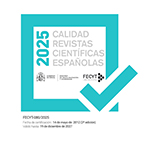Transborder mobility, mobile and multi-stranded subjects in the access to housing. The cases of Iquique, Alto Hospicio and Antofagasta
Abstract
Employing a geographical approach to transborder mobility, this article aims to analyze the border movements of Peruvians and Bolivians who live in the northern cities of Chile (Iquique and Antofagasta) and their access to housing. We propose the thesis that these migrant subjects transit across the border area mainly for labor reasons and due to wage differences associated with crossing the frontier. Thus, the proximity to their place of origin, the possibility of going, returning or staying, their life cycle, as well as the conditions of precarious work and of the housing to which they have access, make them, in many cases, mobile and multi-stranded subjects. Mobility is viewed as the ability to move around the city and frontier area and stranded is observed through the meaning acquired by the housing and access to it. The research is based on 16 in-depth interviews conducted within the framework of a larger investigation, thus identifying the most important aspects in the mobility and circular movements of migrants.
Downloads
Article download
License
In order to support the global exchange of knowledge, the journal Anales de Geografía de la Universidad Complutense is allowing unrestricted access to its content as from its publication in this electronic edition, and as such it is an open-access journal. The originals published in this journal are the property of the Complutense University of Madrid and any reproduction thereof in full or in part must cite the source. All content is distributed under a Creative Commons Attribution 4.0 use and distribution licence (CC BY 4.0). This circumstance must be expressly stated in these terms where necessary. You can view the summary and the complete legal text of the licence.












